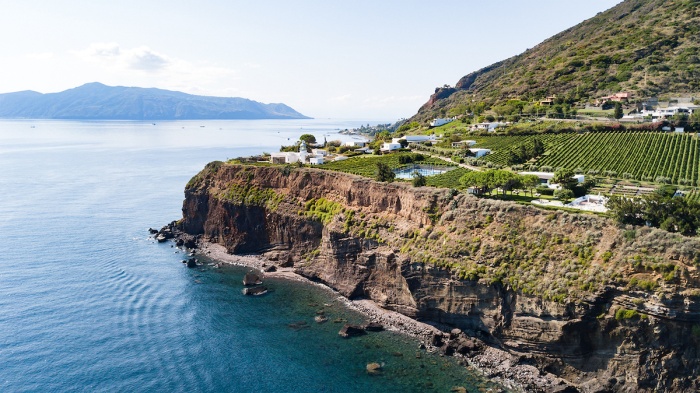An architecture that belongs to a landscape of sea, unspoilt nature, peace and quiet. A project that not only safeguards the territory, but also recovers and redevelops a piece of public heritage, part of the transformation of a place of great value in terms of landscape, history and culture. In the heart of the island of Salina, Sicily, on a windswept promontory that drops straight down into the blue waters of the Mediterranean, the project by MAB Arquitectura for architectural restoration and interior design of the ancient Capofaro lighthouse complex gave shape to six suites in the long-since abandoned, evocative spaces that were once the lighthouse keeper’s quarters. Thanks to a restoration embracing a philological approach that has reconnected the property to its authentic roots and memory, MAB Arquitectura, the firm led by architects Floriana Marotta and Massimo Basile, won a special mention at the 2023 In/Arch Awards in the Reuse/Restoration category.
The suites and island-mood decor: the poetry of “less is more”
Created in the main building of this lighthouse built at the end of the 19th century, the suites, silent and secluded in their unassuming luxury, are an extension of the adjacent “Capofaro Locanda & Malvasia”, an old vineyard transformed into a refined wine resort by the Tasca D’Almerita family and now part of the Relais&Châteaux collection. The MAB Arquitectura project for redistribution and restyling of the interiors was all about minimalism and understatement and it has preserved some interesting elements such as the barrel-vaulted ceilings and the spiral staircase up to the lantern, originally positioned on the roof of the keeper’s quarters.
Measuring either 30 or 50 square metres, the suites all have private gardens and separate entrances, while the largest, measuring 80 square metres, in the middle of the complex, is on two levels. It has windows front and back and a panoramic terrace offering breathtaking views of the sea, vineyards, vegetable plots and gardens. For the interior design, MAB Arquitectura opted for the sober functional character of traditional Aeolian architecture for the custom-made furniture, choice of local materials, furnishings, and fabrics. The interior palette borrows its colours from the surrounding nature: warm and reassuring earthy tones such as brown, sand, white, and beige, are juxtaposed with touches of sea blue.
Microcement floors, white lime walls, masonry and wooden furnishings, limestone washbasins, cement tiles in the bathrooms handcrafted by a historic company in Santa Flavia to the architects’ design: all elements that define a concept of luxury that is cultured rather than contrived. “In surroundings that are so impressively natural and so steeped in suggestive power, we followed the poetry of “less is more” for the interiors, designing each detail with great care but no added frills. We wanted to define each room with an elegance and minimalism to render the idea of refined, understated luxury, of time passing slowly, in the beauty of simple things,” explains architect Floriana Marotta.
The exteriors: recovery and enhancement of the historic lighthouse complex
Still in use today, the lighthouse is slightly set back from the main body of the Capofaro Locanda & Malvasia Estate and it looks out over the splendour of the Aeolian sea like a natural terrace, watching over sailors with its light and iconic image. The MAB Arquitectura project for the outdoor spaces also respects the memory of this place, with recognition of the architectural, historical, landscape, and cultural value of the complex, a true example of the industrial archaeology of navigation. It has been renovated with a philological approach that first saw structural consolidation of the vaults, renovation of the weather- and salt-worn tufa ashlars on the façade, and of the cornices and sills, and then replastering for the lime façade in line with Aeolian tradition.
Architects Floriana Marotta and Massimo Basile also landscaped the area around the lighthouse and, choosing to enhance the genius loci, they drew on this island’s riches, creating dry stone walls and paths in local volcanic gravel, with bamboo dividers on slender structures providing discreet shade for the private gardens of the suites.
The landscape design saw the creation of a small botanical museum in different locations, featuring the main Mediterranean maquis plants and autochthonous species found on the island of Salina, to ensure an emotional cognitive experience for hotel guests.
Sinuous paths wind through the vegetation, allowing visitors to explore themed islands of typical Mediterranean shrubs such as capers, myrtle, broom, lavender and strawberry trees, olives, laurel hedges and mastic trees, as well as prickly pears, rosemary, agave, and bougainvillea. A small adjoining building has been turned into a Micro Museum of Malvasia, a multimedia space housing videos and infographic panels that illustrate a series of themes closely linked to the island’s territory and history. A holiday experience that unfolds gradually, in a place where guests can let go and find their real selves.
The redevelopment of lighthouses represents true regeneration of places with a fascinating past, which sees the heritage of a few finally becoming a shared legacy, as well as an important driver for local economic growth. The Capofaro restoration project is part of the ‘Valore Paese Italia Fari’ project, a plan to enhance the value of public real estate promoted by Difesa Servizi S.p.A. and Agenzia del Demanio (the agency for state-owned property), which consists in giving rooms inside lighthouses in concession to private individuals, to ensure their protection and restoration, while simultaneously promoting the local economy.


